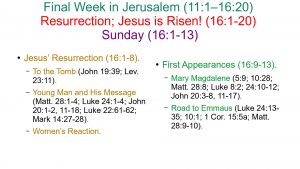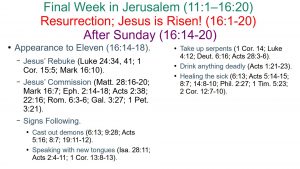Jesus’ Final Week in Jerusalem
Mark 11:1–16:20
Teaching (11:1–13:37)
King (11:1-11)
Sunday: Triumphal Entry (11:1-11).
Lawgiver (11:12–12:44)
Monday (11:12-19).
Tuesday (11:20–14:2).
Prophet (13:1-37)
Trial (14:1-72)
Sacrifice (14:1-26)
Wednesday (14:3-11).
Thursday (14:12-72)
Betrayed and Killed (14:27–15:47)
Death (15:1-47)
Friday (15:1-47).
Resurrection (16:1-20)
Jesus is Risen!
Sunday and Later (16:1-20).
Jesus’ Resurrection (16:1-8).
Question on Validity of the Following (16:9-20).
Mary Magdalene (16:9-11).
Mark here repeats that Jesus had risen early, that is in the morning, on the first day of the week.
Up to this point in Mark, there had been no post-resurrection appearances, so here is recorded the first—to Mary Magdalene.
Before this, the women had gone to see the disciples who didn’t believe them (Matt. 28:8; Luke 24:10-11), but Peter and John ran to the tomb anyway to see for themselves (Luke 24:12; John 20:3-8).
So now we focus on Mary who was a woman from Magdala, a town bordering the Sea of Galilee.
She is described here as having had seven demons cast out of her (Luke 8:2).
This is not unusual, since earlier in Mark, a man had a legion of demons residing within him (Mark 5:9).
John records this event in more detail, so we won’t spend much more time on that (John 20:11-17).
One striking note, however, is the juxtaposition of the once demon-possessed Mary being the one to first witness the risen Lord! (Some think she was a harlot, too, but there’s no evidence of that whatsoever.)
Recall that throughout Mark, Jesus had silenced the witness of the demons, but now relies on one who had been possessed by a demon to be the first to share the good news!
She went and told the disciples who were mourning and weeping over this event, still in Jerusalem.
It’s understandable, the Man they had been following, the One they had devoted their entire lives to for three years was just gone.
They had given up everything to follow Jesus, and now it would seem it was all for naught (Mark 10:28).
On top of that, they had fled from Him and Peter denied Him to His face.
They were so sure they knew what God was going to do and were so upset when that’s not what happened—it was going to be something better!
Yet they still did not believe.
Road to Emmaus (16:12-13).
These next two verses refer to the Lord appearing to two men, one named Cleopas, as they were heading toward Emmaus (Luke 24:13-35).
These two were not of the original Twelve, but were perhaps part of the Seventy that Jesus sent out in the Limited Commission (Luke 10:1).
Emmaus was a village that was about seven miles to the northwest of Jerusalem.
While they were still in the country, the Lord appeared to them.
Here it says that Jesus appeared to them in “another form.”
This is likely a reference to the fact that Cleopas and his friend did not recognize Him at first, not until He broke bread with them after a long discussion.
Even after all this, the disciples still did not believe that He had been raised.
This is amazing, since apparently Jesus had already appeared to Peter by this point (Luke 24:34; 1 Cor. 15:5a), along with all the women who had gone to the tomb (Matt. 28:9-10).
If Mark is the “memoirs of Peter” as some allege, I do wonder why Peter didn’t tell us of this encounter with the risen Lord here in Mark which is only briefly mentioned as an aside in Luke 24:34.
In any event, it was going to take a lot for these disciples to snap out of their unbelief, as we’ll see Jesus’ rebuke in the next verse.
What do we think of the disciples’ unbelief? Is it warranted?
Yes, it is warranted, but it also isn’t. After all, Jesus Himself said He was going to rise again on several occasions, so why was it so hard to make that connection when they heard that He had arisen?
Maybe there was a sense of pride there: “If He has risen again, surely He would have appeared to us first, His closest disciples!”
Or maybe they saw just how dead He was, and realized nobody comes back from such a gruesome death on a cross—but He did!
 Appearance to Eleven (16:14-18).
Appearance to Eleven (16:14-18).Jesus’ Rebuke (16:14).
Jesus finally appears to the Eleven, though this is likely a summary of the times He did appear to them.
Recall, He had already appeared to Peter at some point previously (Luke 24:34; 1 Cor. 15:5).
But a direct sighting does not directly lead to faith!
Luke records that, while Jesus was standing there before them and speaking to them, “they still did not believe for joy” (Luke 24:41).
That’s a peculiar thing to say, as if they simply could not believe their eyes.
Have you ever been in a situation like that, where something so shocking occurred (either a good thing or a bad thing), that you weren’t sure whether or not you could trust your senses? That’s the state the disciples found themselves in.
And yet the Lord rebukes them strongly for their stubbornness and their lack of faith when it comes to the testimonies of those who witnessed Him already: the women disciples at the tomb including Mary Magdalene, Peter, Cleopas, and the one traveling with Cleopas.
But let’s be honest, if someone we were close to died a gruesome death, and one of our friends came in frantic, telling us he’s really alive, would we believe them?
If it’s just one person, most certainly not. We might conclude he had a dream or had gone crazy. But after several people come to us with that same story, I might begin to take notice.
What role do you think their mourning and weeping may have had on their belief? (16:10). It does tend to color one’s view of things, as does any strong emotion.
At the same time, however, they had several other reasons to believe these witnesses, namely the predictions Jesus had given of His resurrection, along with the empty tomb itself!
They already confessed before that Jesus was the Christ, the Son of God, so why would they lose that faith now?
He even predicted they would be scattered despite their cries to the contrary.
They had simply had a crisis of faith that Jesus was here restoring with His appearance and rebuke.
He then goes into how important such faith is with His commission.

